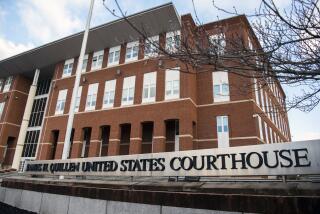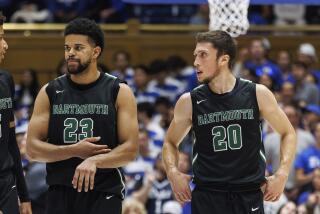Braxston Banks Loses Appeal
- Share via
SOUTH BEND, Ind. — A federal judge today denied a former Notre Dame running back’s request to return to college football after entering the NFL draft.
U.S. District Judge Robert L. Miller Jr. said he understood that Braxston Banks was making a crucial decision at a comparatively young age.
“But while the court sympathizes with Mr. Banks, the NCAA regulations at issue here, whatever their wisdom or soundness as intercollegiate athletic policy, do not offend the federal antitrust laws,” Miller said.
The decision effectively ends Banks’ attempt to return to Notre Dame to play a final year of football. His attorneys have said an appeal of his request to block the enforcement of NCAA rules would be extremely difficult.
Banks of Hayward, Calif., wanted the NCAA blocked from enforcing a rule that strips eligibility from college players who enter the draft or contact an agent. Banks did both, but was not drafted.
NCAA lawyers said changes in the rules could affect “the fundamental nature of college football . . . “ by undermining its amateur foundation.
“I’m not necessarily optimistic,” Banks said after the hearing. “If you know the Coach Holtz rule, I’m being fatalistic.
“If it happens, great. If it doesn’t, I’m prepared to do other things in life.”
Notre Dame Coach Lou Holtz said he told Banks to use his last year of eligibility and stay out of the draft. “My feeling is, if a player goes out early, he shouldn’t play college football,” Holtz told the South Bend Tribune.
Banks had hoped the judge would permit him to report to the Irish football office by a team deadline of 8 p.m. today. He didn’t.
His lawyers’ request for class-action status could have broadened the effect if he won. Thirty-eight players with eligibility remaining entered the 1990 draft, the first open to underclassmen. Twenty, including Banks, were not taken.
Banks hoped another year at Notre Dame would prove he can play for the pros. His lawyers claimed the NCAA violates antitrust law by unreasonably blocking Banks from competing.
The rules questions reveal contradictory thinking within the NCAA. While NCAA attorneys scorned Banks’ arguments in court, executive director Dick Shultz said he doesn’t like the rules.
“Banks’ real complaint is not that he was prevented from competing, but that he freely competed in last year’s draft and was not chosen,” NCAA attorney William C. Barnard said in a court brief.
Shultz, however, pointed out college baseball and hockey players can enter their sports’ pro draft without losing eligibility. “But if a football player or basketball player wants to be drafted, they must submit their names to the draft, and as soon as they do that, they lose their eligibility,” he said.
Changes in the rules could give college players more leverage against the NFL. A player who was not drafted, or was unhappy with his draft position, could return to college and try again later.
“I think if a player can become eligible for our draft and then go back to college if he’s not selected, I think there’ll be growing numbers of college players who will have their spring semesters disrupted,” NFL Commissioner Paul Tagliabue said Thursday.
“I think our clubs would much prefer to have a system which allows players to complete their eligibility and their education before they start worrying about turning professional. But it’s beyond our control at this point, as this court case indicates.”
Banks’ suit contended entering the draft did not make him a professional and should not affect his return to college sports. He sought a permanent injunction blocking the NCAA from enforcing the rules.
The NCAA claimed that would cause “instability of team rosters, difficulties in apportioning scholarships, complications in scouting and recruiting programs, potential disharmony between players who are trying to use the college programs in their pro bargaining . . . (and) diversion of players’ and coaches’ energies and attention. . . . “
More to Read
Go beyond the scoreboard
Get the latest on L.A.'s teams in the daily Sports Report newsletter.
You may occasionally receive promotional content from the Los Angeles Times.










